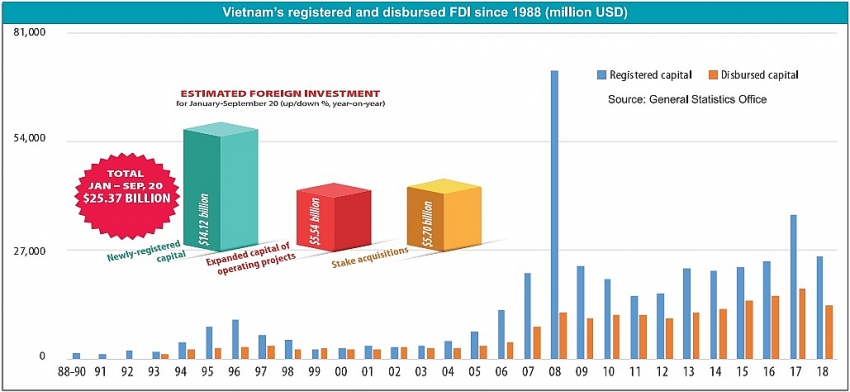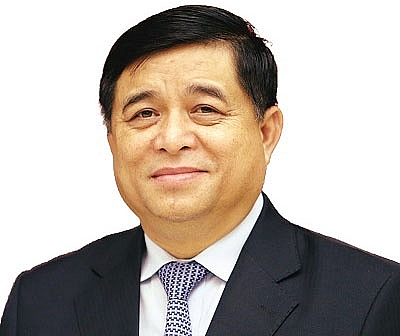Forging future strategies based on 30 years of FDI
 |
The government is set to hold the conference on 30 years of FDI attraction in Vietnam. What are the main topics on the agenda?
 |
The event aims to review and assess the contributions of FDI to the Vietnamese economy over the past 30 years. Making a clear assessment is very important, because these 30 years of FDI are closely linked to the country’s reforms and international economic integration – and a clear view is essential for the attraction of further investment capital.
Such an assessment would also affirm the policy of the Party and the government on economic reforms, international integration, and FDI attraction. Overall, I believe the policy has been very timely, correct, and extremely important, as it has created a turning point for the economy and the national development.
However, in addition to achievements, there have been some limitations to FDI which lead to concerns. Thus, we also have to look at the inefficiencies in FDI attraction, to discover the limitations and their causes.
Do the causes are in the institutional and policy framework or in the process of organising and implementing the policies? Is it our capacity or are our management activities ineffective? Besides, do the causes are in some investors who have intentionally broken the law?
When we have successfully identified the causes, we will be able to come up with sound solutions to remove obstructions in FDI attraction.
Thus, this conference will be a good opportunity for us to get a clear view on all achievements, results, and limitations to be able to take effective measures to improve the quality of FDI attracted in the time to come. This is an important issue.
However, more importantly, we can use these results to determine the new role that FDI will play in the Vietnamese economy, to better fit the rapidly changing domestic and global environment.
Could you elaborate on the role of FDI in the economy in the time to come?
The Party and the government will continue to see FDI as an important part of the Vietnamese economy and doubtless it will continue making important contributions. We do affirm that we will continue attracting FDI and using it effectively in a new strategy and a new direction, so that this source of investment capital can match effectively with our new FDI attraction policy, and bring in the best results for the economy without causing the negative effects that have been experienced over the past three decades.
It is imperative to find new orientations for FDI. We will have to attract investment capital more selectively and with a clear focus, in line with the country’s new development trends.
For example, FDI will have to be closely linked with the country’s reforms and economic restructuring, and especially with the Fourth Industrial Revolution.
In addition, FDI will have to create connectivity between foreign and Vietnamese enterprises as well as regions and economic sectors. FDI will also have to support the economy’s sustainable development and green growth.
We will have to concentrate on attracting more high-technology and environmentally friendly technology which can help save energy and natural resources. Besides, we will also have to lure in more large foreign groups and new large-scale projects which can have major spillover effects on the whole economy.
The Fourth Industrial Revolution is knocking the doors of Vietnam. What changes are necessary to make the country’s FDI attraction match this revolution?
It can be said that Industry 4.0 offers major opportunities for the Vietnamese economy, and we must seize them effectively to further the country’s development, otherwise we will fall behind others.
But the ultilisation of these opportunities must be linked with FDI attraction, and vice versa, FDI attraction must be conducted based on 4.0 foundations, in a manner that draws in new technologies as well as new investment and business formats.
While in the past years we have focused on expanding traditional investment and business methods, non-traditional investment and business methods have appeared, such as the sharing economy.
Thus, we have to continuously improve our legal, infrastructure, and institutional framework in favour of investors and the business community. This is also an impetus for domestic enterprises to improve themselves and develop Industry 4.0 capabilities.
What key messages will the conference send to foreign investors?
First, we would like to thank foreign investors for their remarkable contributions to the Vietnamese economy through their investment projects. True, investors’ primary aim is to find profitable business and investment opportunities, but what we have today – the transformed urban, rural, industrial, and service landscape throughout the entire country – has partly come from foreign-invested enterprises’ contributions.
I would also like to add that currently Vietnam has the most favourable conditions for investors and businesses, as can be seen in the positive assessments from international organisations, justifying the government’s great efforts.
The Vietnamese market is larger than ever, and its political stability is applauded across the globe. Vietnam is now party to many free trade agreements with a very large network of markets around the world.
Besides, significant improvements have been seen in the country’s status and prestige in the international arena as well as in its infrastructure, human resources, and institutions. All of these factors make for a greatly favourable environment for investors and businesses looking for investment destinations.
This is the right time for foreign investors to come to Vietnam and settle down for the long haul – there is tremendous potential to grow along with Vietnam.
What the stars mean:
★ Poor ★ ★ Promising ★★★ Good ★★★★ Very good ★★★★★ Exceptional
 Tag:
Tag:
Related Contents
Latest News
More News
- Interest in renewables drives foreign investment surge (October 10, 2018 | 15:21)
- Bac Giang: building firm FDI foundations of industry and tourism (October 10, 2018 | 13:09)
- Vietnam’s way ahead in foreign investment and economic growth (October 10, 2018 | 11:17)
- FDI into real estate through the roof in Ho Chi Minh City (October 08, 2018 | 12:37)
- Directing FDI into large transport infrastructure projects (October 08, 2018 | 12:34)
- ESMO factory granted investment certificate (October 04, 2018 | 17:23)
- VIR awarded merits and medal for outstanding achievements in FDI attraction (October 04, 2018 | 15:36)
- Hong Kong FTA to boost investment (October 04, 2018 | 14:00)
- FDI gives wings to the banking sector (October 04, 2018 | 14:00)
- Numerous billion-dollar projects licensed at FDI conference (October 04, 2018 | 14:00)






















 Mobile Version
Mobile Version